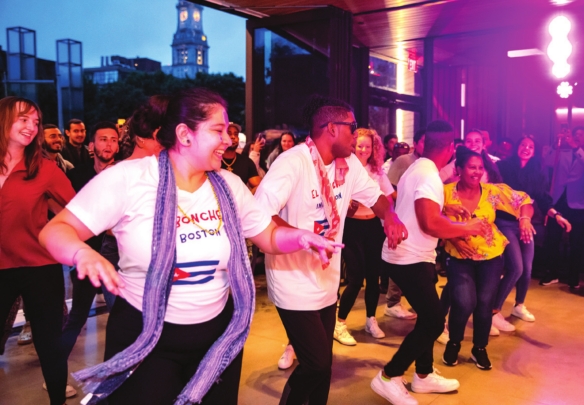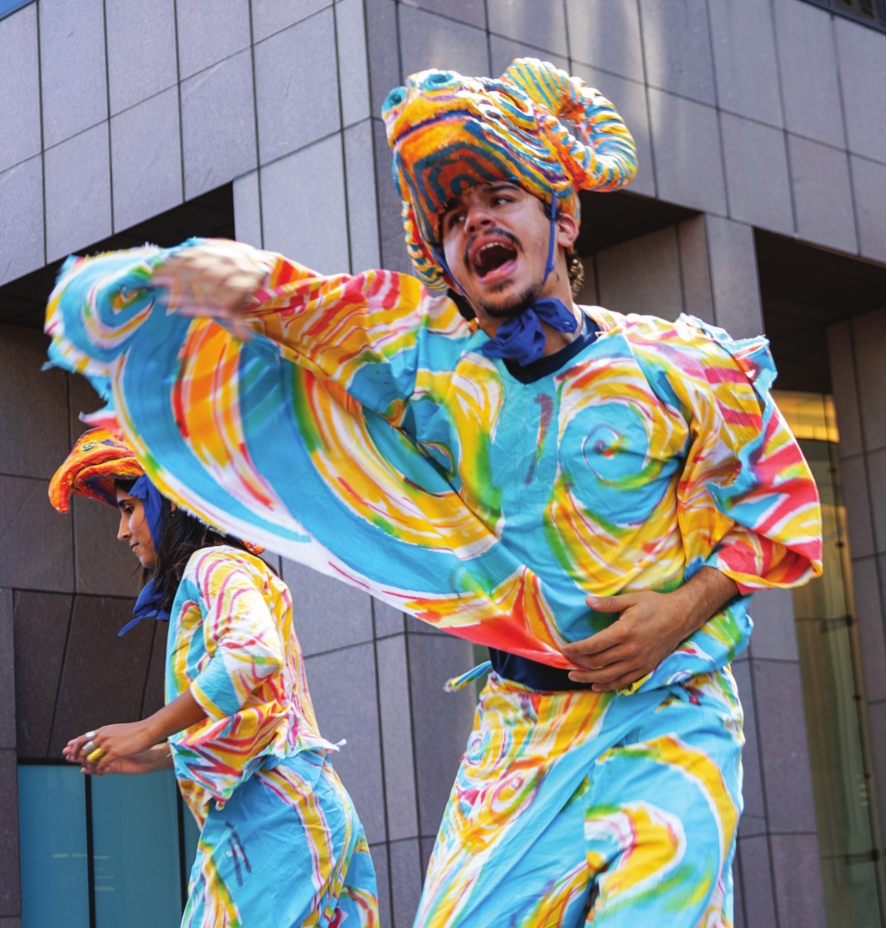
El Bonche in Boston dancers take the stage at last year’s Fiesta en la Plaza.

El Bonche in Boston dancers take the stage at last year’s Fiesta en la Plaza.

Artists from the Puerto Rican theatrical collective Agua, Sol y Sereno.
Last year, hundreds of visitors passed through City Hall Plaza for a taste of arts and culture at the inaugural Fiesta en la Plaza. Over five days in September and October, musicians, dancers, artists and revelers gathered downtown in honor of Latinx Heritage Month.
By all counts, the first iteration of the event was a success, the organizers said.
“It really felt like a fiesta, like a celebration of who we are, how we celebrate, how we dance,” said Elsa Mosquera, co-founder of Ágora Cultural Architects, the organization that hosted the event alongside the city. “And I feel it was our real opportunity to see the Latino community [get] together through the power of arts.”
The idea for the fiesta stemmed from conversations between Mosquera, the team at Ágora and the Mayor’s Office of Arts and Culture about how to celebrate Latinx Heritage Month, which runs from Sept. 15 to Oct. 15, in a “neutral place,” Mosquera said. Simultaneously, the city had begun its push to activate the newly renovated City Hall Plaza, which made the space the ideal location for the event.
This year, the fiesta returns to the plaza with another round of free multi-day programming celebrating Boston’s Latino community. Beginning on Sept. 15, the festivities will kick off with welcome performances by Puerto Rican musicians Fabiola Méndez, Edmar Colón and Alain Mallet and appearances by Colombian artist Manuela Sánchez Goubert and dance group MetaMovements.
In partnership with the city, Ágora will also debut an exhibit of Afro-Caribbean visual arts that will open that same day.
Later, on Sept. 19, the fun continues with Afro-Latin film presentations at the Civic Pavilion on the plaza. The fiesta will conclude on Sept. 27 with a night of Cuban salsa, courtesy of the band Clave & Blues, who will be accompanied by dancers of El Bonche, a group that hosts Cuban dance events in the city.
In putting together the pro gramming, Mosquera said the organizers focused on representing the various Latino ethnicities in Boston, with an emphasis on Caribbean and Colombian culture this year.
Latinos make up about 20% of Boston’s population, according to Census data, and yet they are “underrepresented in the arts realm in this city,” said Mosquera.
Born in Colombia and raised in Puerto Rico, Mosquera arrived in Boston 10 years ago and previously held the role of arts director at the nonprofit Inquilinos Boricuas en Acción, where she worked with artists from all over Latin America and witnessed the ability of art to bring people together.
“I really think there is a huge need to represent Latino arts — because it’s the representation of the community that lives in the city — and to really show the contributions that Latinos have made to the landscape of the city,” she said.
Kara Elliott-Ortega, chief of arts and culture for the city of Boston, said the city has been working to improve the visibility. Last year, the city provided technical assistance to artists entirely in Spanish and allocated some of its pandemic federal relief funding to East Boston, part of which was given to artists, she said.
The city is also a key partner in Fiesta en la Plaza, funding the event through a grant and collaborating with Ágora to spotlight Latino arts and culture.
It’s important to “highlight our communities in the civic center” where elected officials are stationed, Elliott-Ortega said of the choice to hold the fiesta on City Hall Plaza. And while celebrating Latino arts and culture during a designated month is crucial, there continues to be a need to uplift the community and its diversity every day, she added.
“There’s so much nuance to what it means to be a Latino, what it means to be any immigrant group or demographic,” she said. “And so I get really excited to see just the variety of people who identify as Latinos, all the different ways that that’s expressed, all the different countries, and all the different kind of mixes of language and cultural representation.”
ON THE WEB
Learn more at culturalagora.com/fiesta-en-la-plaza